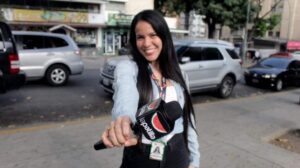“Are you going to kill my daughter? Are you going to harm an innocent girl because you couldn’t catch me?"
Those are the words of Xiomara Barreto, a social activist and leader of the Venezuelan opposition party Copei, in an audio recording posted to social media on Aug. 25.
Barreto is the mother of Ana Carolina Guaita Barreto, a reporter for the online news portal La Patilla who was detained by Venezuelan authorities outside her home on Aug. 20, in the state of La Guaira, on Venezuela’s central coast.
Guaita Barreto is the third woman journalist arrested in the wave of protests that erupted after Venezuela’s presidential election on July 28. She is also one of the 230 women arrested as part of the state’s repression, according to the human rights organization Foro Penal.
Guaita Barreto’s family says her arrest was retaliation against her parents, who participated in the election campaign of Venezuelan opposition candidate Edmundo González Urrutia.
“I have my 32-year-old daughter as hostage of the governor [José Alejandro Terán],” Barreto continued in the audio recording. “I ask that my daughter be freed.”

Ana Carolina Guaita Barreto, reportera del portal noticioso en línea La Patilla, fue detenida por autoridades venezolanas en las afueras de su casa el 20 de agosto. (Foto: La Patilla)
Her brother, Carlos Guaita, told LatAm Journalism Review (LJR), that family members were able to visit Guaita Barreto in detention after not knowing her whereabouts for eight days. She appeared before the public prosecutor and was charged with association for criminal activity, terrorism and violent acts.
A representative from the Venezuelan Women Journalists’ Network told LJR they feel great concern over the growing persecution of women journalists.
“They have been subjected to arbitrary arrests and charges like terrorism and incitement to hatred,” said a network spokesperson, who asked not to be named out of fear of reprisal. “These actions are not only unjust but they flagrantly violate due process, depriving the detainees of their right to an adequate defense.”
Women journalists have also been victims of censorship, stigmatization and physical and verbal assaults. Between July 29 and Aug. 4, the Venezuelan Press and Society Institute recorded 79 violations of press freedom, 23 of which targeted women.
On Aug. 27, the Inter-American Commission on Human Rights (IACHR) granted precautionary measures to Guaita Barreto, saying she is in a situation of grave and urgent risk of irreparable harm.
Journalist Deysi Peña is also in prison, accused of terrorism, incitement to hatred, resisting authority, vandalism and other crimes, according to the youth activist group Sin Mordaza.
Peña was arrested for taking and posting photos on social media of a protest on July 30. In a video published by the National Press Workers Union (SNTP, for its acronym in Spanish), Peña’s daughter said Peña was the household breadwinner and that her two younger siblings, both under seven, keep asking where their mother is.
“My brothers and I just want our mom back home because reporting is not a crime,” said Barbara Canino Peña in the video published on Aug. 6.
Another woman journalist arrested after the election was entertainment reporter Carmela Longo.
On Aug. 20, Longo was fired from the government-run newspaper Últimas Noticias, and five days later, members of the national police raided her home, took her into custody, and charged her with terrorism and incitement to hatred, according to the SNTP.
Longo was released but is barred from leaving the country or speaking out about her case and is subject to regular court appearances.
#ATENCIÓN "Así llega la reportera gráfica Deisy Peña a los tribunales del estado #Miranda para ser imputada por delitos que no cometió", denunció el SNTP.
Fue trasladada de Los Teques a Ocumare del Tuy y hoy llevada de nuevo a Los Teques para ser presentada #08Ago pic.twitter.com/NGOYqVZviE— NTN24 Venezuela (@NTN24ve) August 7, 2024
In Venezuela, prison life is marked by overcrowding, lack of access to basic services, and gender-based violence, according to the Venezuelan Prisons Observatory (OVP), an NGO that advocates for prisoners’ rights.
According to OVP, women deprived of freedom in Venezuela are at risk of physical and psychological torture, and even denial of adequate medical care.
In Peña’s case, she is being held in a women’s prison in Ocumare del Tuy, three hours from her family’s home, making it difficult and costly for her relatives to visit, according to the SNTP.
Guaita Barreto is still detained at the Security Directorate of the La Guaira Governor's Office, isolated from the general prison population.
“She told us she has not been physically or psychologically abused and is receiving her daily meals. Given the circumstances, she’s ‘okay,’” her brother told LJR.
The spokesperson for the Venezuelan Women Journalists’ Network said that detained female journalists, activists and politicians face heightened vulnerabilities in Venezuela.
“The risks of sexual violence and neglect of basic needs related to menstrual, sexual and reproductive health must also be considered,” the spokesperson said. “The escalation of violence and state persecution we face as women journalists not only violates our rights as communicators but also has a devastating impact on our mental and physical health.”